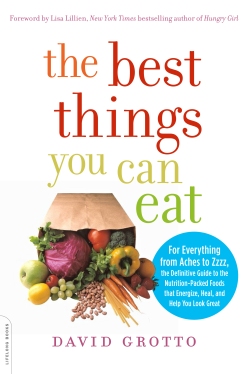By David Grotto, RDN, LDN, author of The Best Things You Can Eat
This post is sponsored by SILK brand soy milk.
Though I’m a father of three daughters and know how soy consumption at an early age may have breast cancer protective benefits, I’m here to say that soy is not for women only! In fact, soy offers complete protein and a variety of essential nutrients that contribute to men’s health.
Good for the heart and every other part! Soy is good for the heart because it is high in soy protein and fiber, contains heart-healthy fats, micronutrients and antioxidants called isoflavones, and is low in saturated fat and cholesterol free. Whole soybeans are packed with fiber and healthy fats, and are rich in zinc, magnesium, iron and bone-building calcium. According to the FDA, consuming 25 grams of soy protein per day, as part of a healthy diet low in saturated fat and cholesterol, may help reduce the risk of heart disease. Soy helps fight heart disease by research shows lowering LDL (“bad”) cholesterol. You’ll also find that soy is one of the few plant sources of omega 3 fats, which have anti-inflammatory benefits throughout the body. Regular soybeans have soluble fiber that helps suck up cholesterol before it gets a chance to clog guys’ arteries. Fermented soy foods, like miso and tempeh, contain probiotics that have been found to be effective for lowering cholesterol, too!
Soy and testosterone. Andropause is a condition where men experience low levels of the male sex hormone, testosterone. Contrary to popular belief, not only does soy not lower soy protein, testosterone gets a boost from added protein in the diet. Ingesting high quality protein around the time of exercising has been shown to increase androgen binding sites (which attaches to testosterone) in muscle tissue. The volume of scientific studies also support that whole soyfood intake has no negative effect on erectile function, testosterone levels, reproductive hormones, sperm motility, or sperm quality. Scientific consensus supports soy as a part of a healthful lifestyle for both genders.
Diabetes: Adult diabetes is on the rise in both women and men. But the good news is that following a healthy lifestyle and calorie-controlled diet that includes whole soyfoods may help keep diabetes at bay. A research study found men who were given a dry roasted soybeans had significantly reduced fasting glucose and triglycerides in comparison with the control group. Also, the soybean supplement group showed enhanced antioxidant activity which may help protect against free radical damage in type 2 diabetes.
Other health benefits. A Chinese study found that soybeans added to the diets of healthy volunteers improved immune and brain function. Soy is an excellent source of the b-vitamin thiamine and is also a source of vitamin B-2 (riboflavin) folate. A large study found that those with higher levels of vitamin B-2 and folate in their blood had lower risk of colorectal cancer.
Some enjoyable and popular whole soyfoods include edamame; whole cooked soybeans; tofu, tempeh and soymilk. Here’s a popular smoothie that my guy patients really enjoy.
Soy Cherry Good!
Servings: 1
Ingredients:
1/2 cup lite vanilla SILK soymilk
2 tablespoons almond or peanut butter
1 cup frozen unsweetened cherries or strawberries
1 tablespoon agave syrup
1 teaspoon freshly ground espresso beans
¼ tsp vanilla extract
1 dash of nutmeg
1 dash of cinnamon
Directions:
Combine all ingredients in blender. Blend until smooth and sprinkle nutmeg and cinnamon on the top and serve.
References:
The Best Things You Can Eat: For Everything from Aches to Zzzz, the Definitive Guide to the Nutrition-Packed Foods That Energize, Heal, and Help You Look Great. Da Capo/Life Long Books, January 2013. New York.
Yimit D, Hoxur P, Amat N, Uchikawa K, Yamaguchi N. Effects of soybean peptide on immune function, brain function, and neurochemistry in healthy volunteers.
Nutrition. 2012 Feb;28(2):154-9.
Eussen SJ et al. Plasma vitamins B2, B6, and B12, and related genetic variants as predictors of colorectal cancer risk. Cancer Epidemiol Biomarkers Prev. 2010
Oct;19(10):2549-61.





